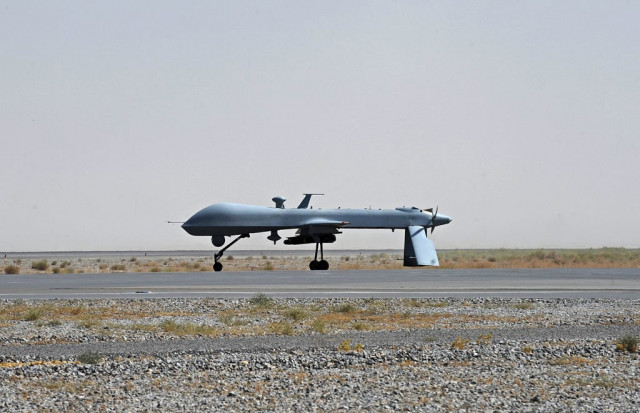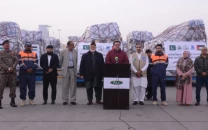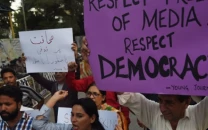Pakistan may allow drone strikes if given control over campaign: Former CIA official
Former director of counterterrorism centre says politics surrounding the sovereignty might not be a big issue then.

Former director of counterterrorism centre says politics surrounding the sovereignty might not be a big issue then. PHOTO: AFP/FILE
"Under those circumstances, the politics surrounding the country’s sovereignty might not be a big issue," he said.
The United States would likely seek approval from future Afghan leaders for most or all of post-withdrawal training activities and counter-terrorism activities - possibly including the use of drones, which have been a defining feature of the Obama administration security strategy in far-flung places.
However, the lack of a sizeable US troop presence in Afghanistan could mean that drones become one of the few remaining tools the United States has against militant groups in the region.
Micah Zenko, a fellow at the Council on Foreign Relations think tank, said it would be very difficult to continue the drone program if Afghan President Hamid Karzai's successors decide against allowing launches from Afghan soil after foreign troops withdraw.
Central Asian nations that might allow such flights are too distant from likely target areas, while the US military currently has only limited ability to operate drones from ships in the Arabian Sea or elsewhere.
"Short of receiving basing access from a neighbouring state, and overt overflight support from Afghanistan and Pakistan, it would be a very difficult operational risk to conduct drone strikes into Afghanistan or Pakistan," Zenko said.
Troops withdrawal
US officials have warned of the potential for catastrophe if Karzai fails to sign a security pact to permit foreign forces to stay in Afghanistan beyond 2014.
Unless a deal is reached to enable a modest US force of perhaps 8,000 to stay in the country, the Taliban might stage a major comeback, al Qaeda might regain safe havens and Afghan forces might find themselves starved of funding, the officials say. The post-2014 US force envisioned would train and assist Afghan soldiers and go after the most dangerous militants.
But even if the Obama administration abruptly pulls out its entire force of 43,000 a year from now, it would still retain a handful of limited security options in Afghanistan.
While US officials have not discussed a possible post-withdrawal scenario in public, the United States might still, even under those circumstances, continue to provide small-scale support to local forces, mount some special forces missions, and use drones to counter al Qaeda and help keep the Taliban at bay.
A narrowed security mission would in many ways track a decade-long shift in US strategy, away from the counter-insurgency campaigns of the 2000s toward the Obama administration's preference for low-profile support to local forces combined with occasional targeted operations.
Even so, full withdrawal of the main US force would make it more difficult to prevent al Qaeda militants regrouping along the Afghanistan-Pakistan border and to stop the Taliban from solidifying control of its southern Afghan heartland.
"We have a lot of capabilities, but without the (Bilateral Security Agreement), we are very limited," a US defence official said on condition of anonymity, referring to the bilateral pact the United States is seeking with Karzai.
For now, US officials remain hopeful - in public at least - that Karzai will drop last-minute demands and sign the pact well before Afghan elections in April. They say they have not begun to plan for a full withdrawal or a possible post-withdrawal mission in earnest.
But General Joseph Dunford, who commands international forces in Afghanistan, told reporters in Kabul recently that, "If there's not an answer in December, I expect that we'll begin to do some more detailed planning about some other eventuality besides the (post-2014) mission."
To understand what options the United States might have in Afghanistan following a full withdrawal, "you can look to places where we are already active countering terrorism, like Iraq, Libya, Somalia," another US defence official said.
Targeted missions and small-scale support
Even if all foreign troops do withdraw from Afghanistan, the United States might still send small numbers of special forces, such as Green Berets, to do limited, short-term training missions at the request of Afghan officials. They might also launch occasional raids against militants, as they have in Libya or Somalia.
"This is a model that's used around the world," the first defence official said.
In October, US forces seized Abu Anas al-Liby, a suspect in the 1998 bombings of two US embassies, in Tripoli, Libya. It is unclear what sort of authority it received from the Libyan government.
The same weekend, US special forces launched an operation against an al Shabaab militant in Somalia but failed to capture him, US officials said.
In Iraq, following the US military withdrawal in 2011, the United States set up a large security office attached to its embassy in Baghdad to oversee military sales and provide limited support and advising to the Iraqi government.
US special forces have also been invited to return to Iraq to provide counterterrorism and intelligence support to Iraqi forces, the general who headed that office said last year, according to a report in the New York Times.
The US military also is providing some training and equipment to security forces in Yemen, defence officials have said, as the Obama administration seeks to weaken al Qaeda and other militants in the Arabian Peninsula.
Light footprint
The former director of the CIA's Counterterrorism Center said that if withdrawal of the main US force from Afghanistan becomes necessary, the United States should consider putting some special forces under CIA authority to train local forces or perform limited counter-terrorism activities, possibly along with some members of the CIA's small paramilitary force.
"The US footprint would be much smaller, and we would have many fewer capabilities. But it might not be a bad thing," Grenier said. A light US footprint would give Afghan forces more of a leadership role in pursuing militants than they have had in the past, he said.
Retaining even a very narrow ability to support elite Afghan soldiers could be especially important if plans for a larger training mission collapse along with US efforts to finalise the security pact. Top US officials have warned that the $4 billion a year in outside aid promised for Afghan forces would be less likely to materialize if the full departure of foreign troops limits lawmakers' ability to track US aid.
The administration would also have to rethink much of its development aid as well as its diplomatic strategy if US troops depart.
Without outside help, Afghanistan's central government will likely lack the means to pay police and soldiers, encouraging a fracturing of its military along ethnic or regional lines.
"The biggest risk if we go to the zero option is that the Afghan military falls apart, and then the Afghan state falls apart," said retired Lieutenant General David Barno, who commanded US and Nato forces in Afghanistan from 2003-2005.


















COMMENTS
Comments are moderated and generally will be posted if they are on-topic and not abusive.
For more information, please see our Comments FAQ